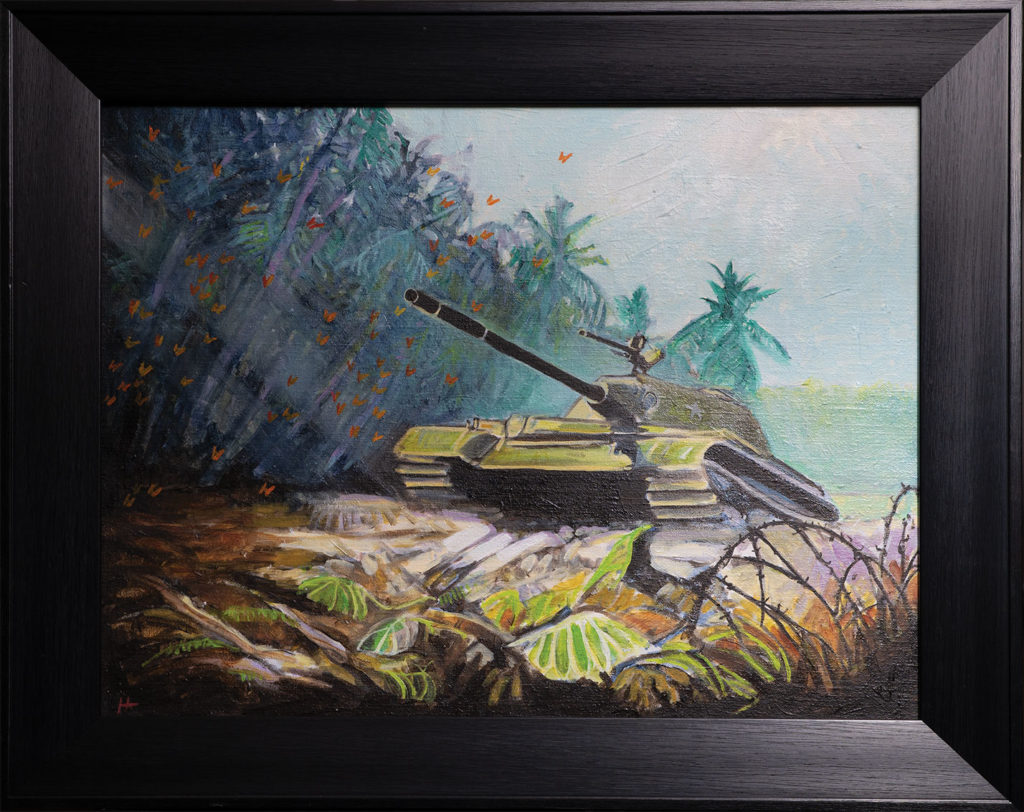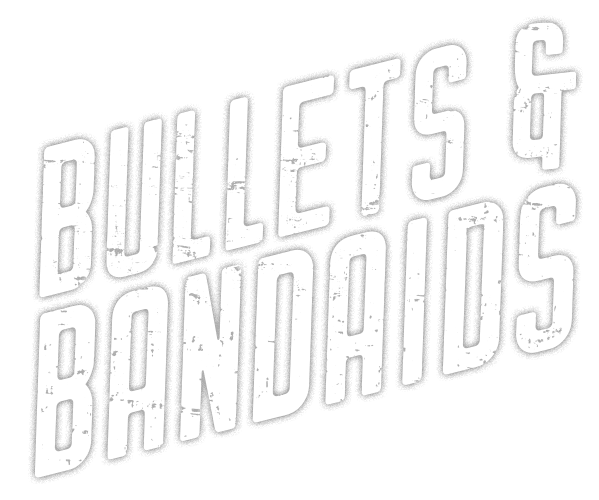
Haley Beann
20″ x 16″ • Oil on canvas
Artist Statement
The purpose of this piece was to capture a moment in time. In Vietnam, the writer with his fellow soldiers and the tank came around a corner upon a Lipton Tea plantation. A group of Monarch butterflies flew up from the fields and across the road. The imagery of the jungle behind them with the cold, dangerous tank interwoven with beautiful butterflies gives the possibility of finding moments of beauty in war.
Instagram: @sovereign.creative
by Ron Osso
“I’ve always been pro-war and I let my feelings known to everyone who would listen. Sometimes it’s the only way to solve a problem. Yet I spent six years in several colleges, changed my major almost as often as I changed my shirt, all trying to avoid the draft. But I was drafted in 1969 anyway. And in retrospect, it was one of the best things that ever happened to me.
After basic training at Ft. Leonard Wood, Missouri, AIT at Ft Ord, California and jump school at Ft. Benning, Georgia he was offered a job, at Fort Benning, as an NCO. They told him it came with a promotion to E-6, but that never happened. So, in his words, “I finally decided to put my ass where my mouth was given my pro war beliefs and volunteered for Vietnam.”
Fields was assigned to a mechanized unit spending his days on patrol in an armored personnel carrier in the central highlands of South Vietnam. He’d hoped to be assigned to the 101st or 173rd airborne, but that took some time to work out. He wasn’t thrilled with his first assignment. The men were dealing with several negative issues… low morale, battle hardened, racially tense and they all had one thing in common, they were draftees.
“When you’re in a war, you want to work with guys who want to be there, volunteers, people who work well together, and have your back, guys who are there to get a job done. That’s not the way it was with this unit. Shortly after arriving in-country I put in to be transferred to a Ranger unit. They didn’t waste any time.”
While out on an operation near Kon Tum with 4th Armor, mechanized unit, the Rangers sent out a helicopter, “plucked” Fields out of the jungle and took him in as one of their own. During his ten months as an Airborne Ranger, Fields went out on eighteen missions. Typically, they lasted between four and eight days. His platoon would operate between forty and a hundred miles behind enemy lines.
“Our Ranger units were often made up of three to four GI’s and a Montagnard scout.”
Montagnard’s were indigenous people who lived in the highlands, they knew the terrain and the ways of the North Vietnamese soldiers. The small unit would go out on recon missions, set up ambushes, blow a bridge, whatever was called for and for support, they were almost always in range of Huey supply and evacuation helicopters, Cobra gunships and artillery support.
Fields sits back in his chair and laments about Vietnam. He compares it to South Korea.
“They have a place at the table of nations. It wasn’t perfect nor totally flawed, but the Korean war stabilized that region and created a perimeter to the advancement of communism.”
He believes Vietnam could have been a fantastic country, they were very entrepreneurial people. But instead, he calls it a tourist destination today.
“I left Vietnam in 1970. We fully abandoned them less than three years later. Those people paid a terrible price in years and lost lives, and they fought only to be free. They weren’t trying to conquer anything or take something that wasn’t theirs. They just wanted their independence. If the North Vietnamese had stopped their prosecution of the war, if they had just stopped shooting, the war would have been over. Now, almost fifty years after our support ended, the South Vietnamese people still don’t have the right to vote or have so many of the things we take for granted. I think if we hadn’t abandoned them, Vietnam could have been as successful, if not more so, than Korea. But when we cut off all aide, not only pulling our troops, but everything, we did nothing like we’re doing to support The Ukraine right now, we’re giving them a real chance to hold on to their country.”
Fields appears pensive.
“I feel the Russian war in Ukraine is the war the U.S. has been training to fight for sixty years. But we grossly over-estimated Russia’s capabilities. The mistakes they are making are the things we are particularly good at, logistics, planning, operational control, communications. I’m amazed at how poor their leadership, equipment and morale is.”
Fields feels as if many soldiers who were in Vietnam back in the sixties and seventies didn’t believe in the mission.
“It’s got to be difficult to undertake risking your life and killing other people, even in war, when you don’t fully believe in the mission.”
He says he has no emotional scars from his ten months in country, says he didn’t do anything wrong he just did what soldiers do in a war. His only regret…
“I didn’t kill more of the enemy.
He felt dodging the draft as he did for six years, bouncing around from one college to another was hypocritical because he’d always talked the war talk, but hadn’t walked the walk.
“I know that some soldiers say fighting the war changed them, caused them to feel broken. My experience was the opposite. Fighting in Vietnam made me whole, it put me together rather than tearing me apart. I don’t think that would have happened had I not served. I found that putting my life at risk for something I believed in, without paying the price; I mean I wasn’t wounded I didn’t do anything that was compromising to me, well that’s about as good as it gets. Truth is, I learned more in twenty-two months in the Army than in all six years of college, and the big lesson I learned from the college/US Army experience was, don’t spend a lot of your life avoiding anything, it’s such a waste.”
Fields had a successful career in advertising, marketing, and publishing. A career that lasted for twenty-seven years.
He laughs as he recalls his first advertising job.
“I never thought I’d sell out and join the corporate world. But a friend convinced me to go on an interview for a recreational magazine company. I bought a business suit, got a haircut and shaved off my beard, then I walked into the publisher’s office. He was sitting behind his desk, in a Hawaiian shirt, puffing on a stogy. It wasn’t what I expected.”
Fifteen minutes into the interview, after Fields had talked about his military service, the president laughed. Fields asked him what he found funny.
“Look George, I like you, you were an Army Ranger, I respect that, you already have the job, you’re my man.”
Fields feels as though almost every job he had during his career… doors were opened because he was a veteran.”
When asked what his most memorable moment while in Vietnam was, he gave a surprising answer.
“We were on a mission east of Pleiku. We were charged with clearing the road of land mines. Our unit was in column formation, consisting of three tanks up front, the grouping called a varsity, another varsity in the rear and five APC’s between them. The three forward tanks were there to trip any mines that may have been strategically placed by the enemy. Anyway, we’re clanking along this road, making a tremendous racquet, the noise was deafening, the smell of diesel fuel, the hot metal, everyone armed to the teeth, I mean nothing says WAR in capital letters, bigger than that. We’re all a little tense, but ready for whatever might happen. So, we come around a bend in the road, and there, standing in front of us, is a Lipton Tea plantation. It looked so out of place. It appeared untouched, beautiful, so green, cool and lush. Then, while we were passing the plantation the strangest, most beautiful thing happened. Out of nowhere about a million beautiful, colorful butterflies surrounded us and fluttered along with us for a while. The contrast between our clanking column formation and these beautiful creatures was extraordinary. That moment lives in my mind today and probably will for the rest of my life. All that was missing was a musical score to go along with this incredible vision.”
Fields thinks National Service should be mandatory. Not necessarily universal military service, but if everyone served a year or two, in support of our country, in any of several capacities, ecologically, educationally, working with the auxiliary police or the military, so many issues like the divisiveness our country is experiencing today could be addressed. Serving a common cause tends to pull people together.
“An eighteen or nineteen-year-old who doesn’t know what they want or what they are going to do, a kid who’s just been hanging out with other kids on the block, I say join the military and get your GI Bill. Your college would be paid for. You’ll come out with more purpose, more clarity as to what you want. The GI Bill is one of the most spectacular things the United States has ever done.
George C Fields Jr. Is retired now, has been for twenty-six years. He lives in San Miguel de Allende, Mexico. He and his wife Lauda live in a small factory he converted into unique living space.
“I originally bought the place and planned to manufacture state of the art kites, but just as we were getting started, imports of similar product flooded the market and we never really got off the ground, we just couldn’t compete. So now I had a factory and wasn’t sure what to do with it, so I turned it into our home.”
The home in San Miguel seemed like a logical next step for George and Lauda. Prior to moving to Mexico, he owned a loft in Soho, a trendy, artsy, former industrial area in New York City, so living in a converted industrial space was nothing new to them.
They spend a lot of their free time on George’s BMW motorcycle, traveling all over Mexico and down into Central and South America, usually with a few other couples. George likes to snorkel and spend time at their other house at the beach where he is part owner of a hotel. They also have a son, Clai who is an Army Intelligence Captain, a daughter-in-law, Amber Nieto and granddaughter, Olivia Ann.
“Yeah, life is pretty perfect.”
